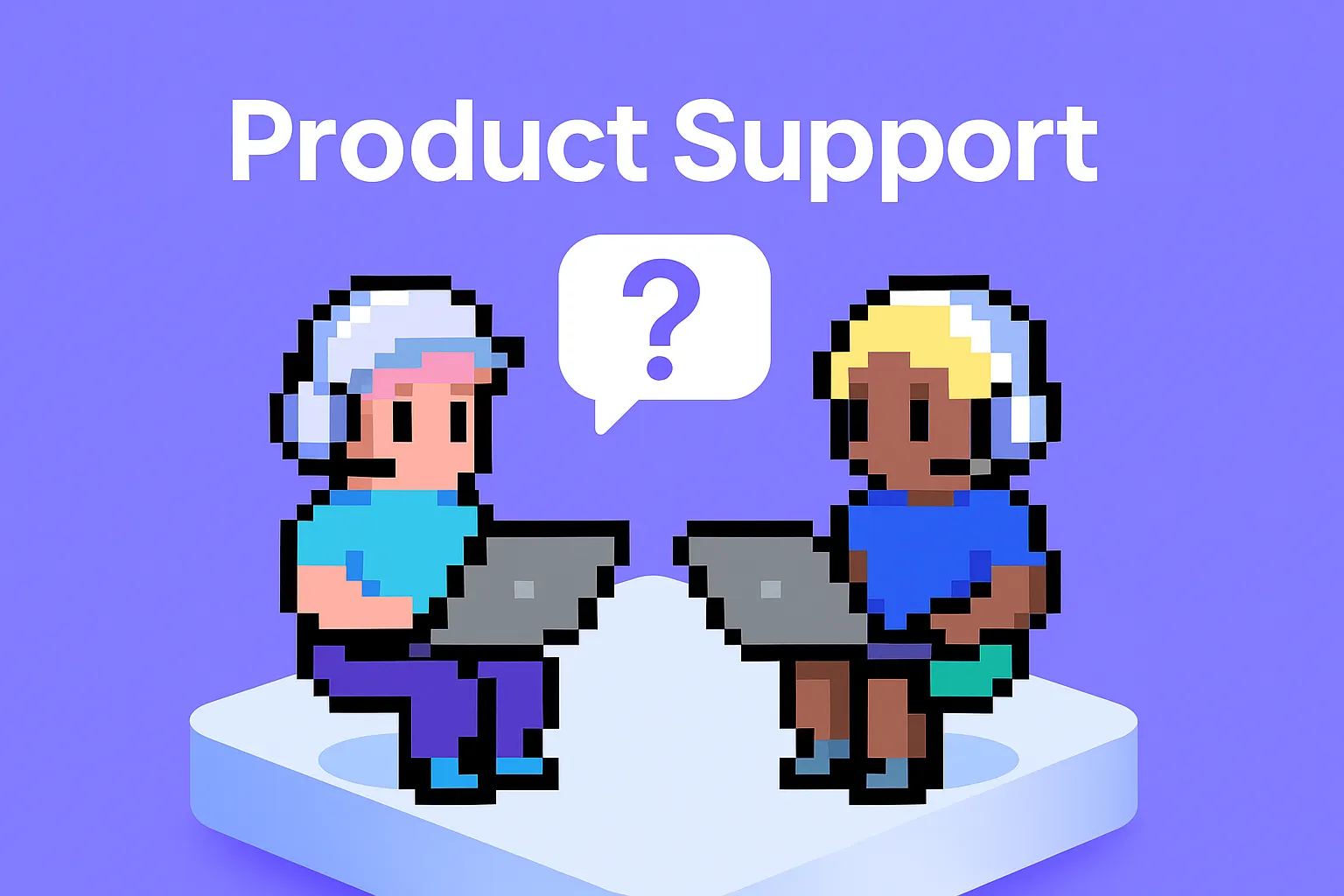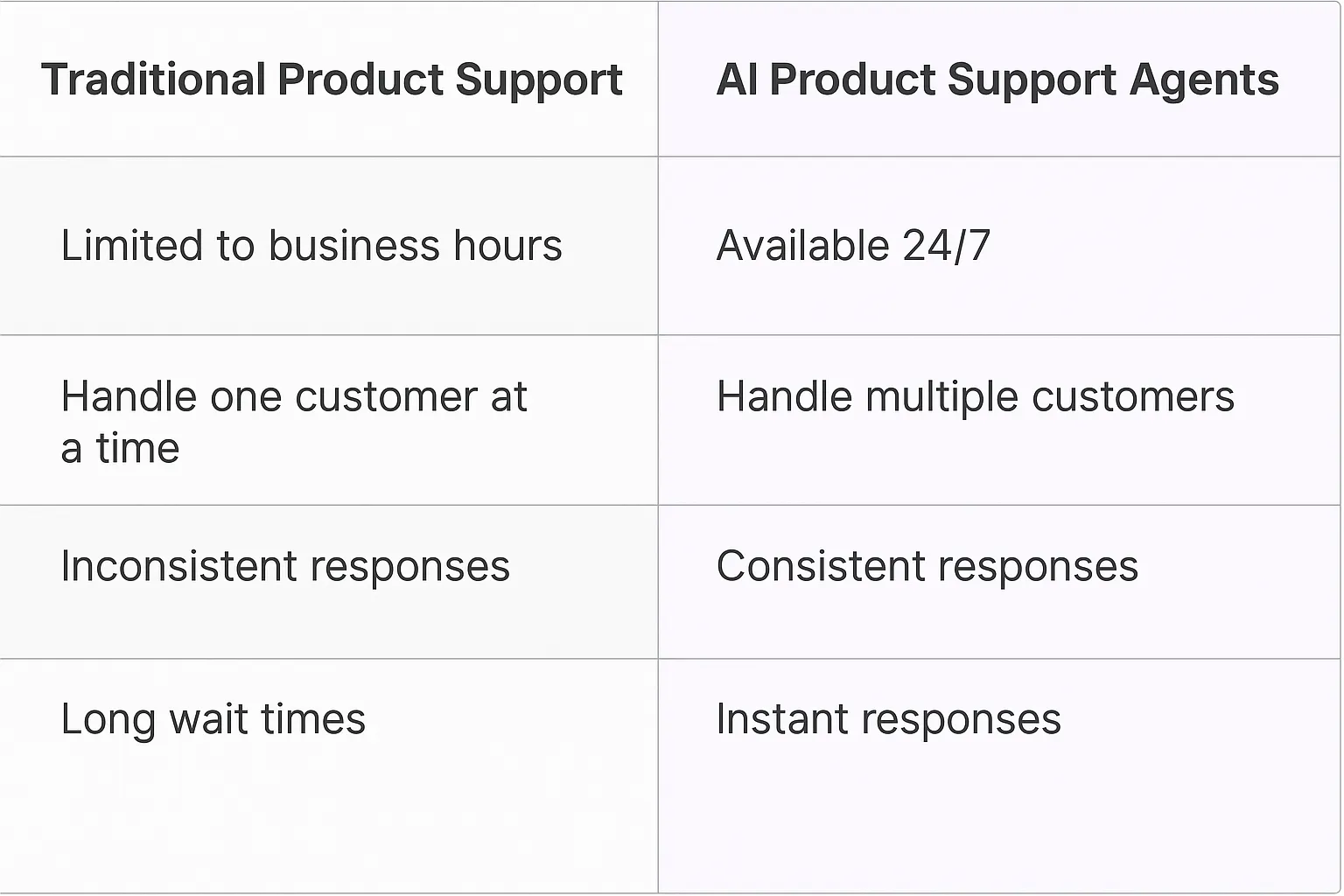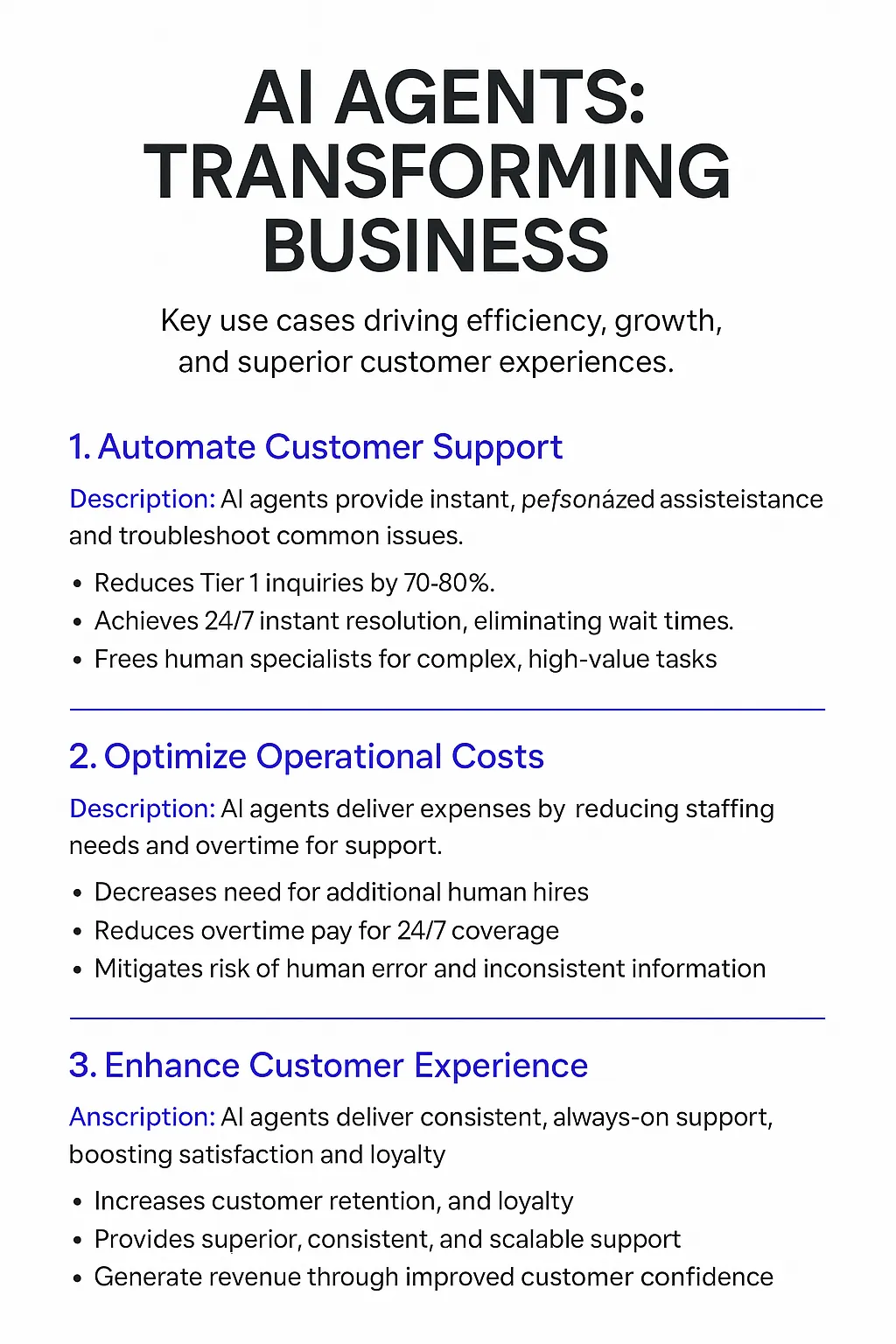A Product Support Specialist is a customer-facing professional who provides technical assistance and guidance for a company's products or services. They serve as a crucial link between the customer and the organization, addressing inquiries, troubleshooting issues, and ensuring customer satisfaction. These specialists possess in-depth knowledge of the product lineup and are adept at explaining complex features in an easily understandable manner. They may handle support requests through various channels, including phone, email, chat, or in-person interactions. Product Support Specialists often collaborate with other departments, such as engineering or product development, to relay customer feedback and contribute to product improvements. Their role is essential in maintaining customer loyalty, reducing churn, and enhancing the overall user experience.

Before AI agents entered the scene, product support was a labor-intensive operation. Companies relied on armies of human support specialists, armed with knowledge bases and scripted responses. These teams would field an endless barrage of customer inquiries, often repeating the same information ad nauseam. It was a necessary evil, but one that scaled poorly and left both customers and support staff frustrated.
The typical support flow involved customers navigating phone trees, waiting on hold, and then explaining their issues to agents who might need to put them on hold again to research solutions. For companies, this meant high labor costs, long training periods for new hires, and the constant challenge of maintaining consistent support quality across a large team.
AI agents are fundamentally changing the game for product support. They're not just faster or cheaper – they're creating entirely new possibilities for how companies interact with and support their customers.
First, AI agents offer true 24/7 availability without the need for shift work or overtime. They can handle multiple inquiries simultaneously, effectively eliminating wait times. This alone is a massive win for customer satisfaction and operational efficiency.
But the real power lies in their ability to learn and improve continuously. Unlike human agents who might forget details or have off days, AI agents consistently apply the sum total of their knowledge to every interaction. They can instantly access and synthesize vast amounts of product information, customer history, and solution databases to provide highly personalized and accurate support.
AI agents also excel at pattern recognition. They can identify trending issues before they become widespread problems, allowing companies to proactively address potential product flaws or confusing features. This predictive capability turns support from a reactive function into a proactive force for product improvement.
For customers, the experience is transformative. Gone are the days of repeating information or being transferred between departments. AI agents can handle complex, multi-step problems, guiding users through troubleshooting processes with patience and precision. They can even anticipate needs based on usage patterns and proactively offer assistance.
From a business perspective, the scalability is unmatched. Companies can handle surges in support volume without scrambling to hire and train temporary staff. The cost savings are significant, but more importantly, the quality and consistency of support improve dramatically.
Perhaps most excitingly, AI agents are enabling new forms of proactive and embedded support. Imagine products that can sense when a user is struggling and offer help before they even need to ask. Or support agents that live within your product, providing contextual assistance exactly when and where it's needed.
The shift to AI agents in product support isn't just an incremental improvement – it's a paradigm shift that's redefining what's possible in customer service and product experience. Companies that embrace this technology aren't just saving money; they're gaining a powerful competitive advantage in customer satisfaction and loyalty.

Product support is a critical function that can make or break customer relationships. AI agents are poised to transform this space, acting as digital teammates that augment human capabilities. Let's dive into some key processes where these AI-powered allies can create significant impact:
Breaking down the support function further, here are specific tasks where AI agents can be game-changers:
The integration of AI agents into product support isn't about replacing humans. It's about creating a symbiotic relationship where AI handles the routine and data-intensive tasks, freeing up human specialists to focus on complex problem-solving and building meaningful customer relationships. This shift will redefine the role of product support specialists, elevating them from reactive problem-solvers to proactive customer success partners.
As these AI capabilities continue to evolve, we're likely to see a new breed of support professionals emerge - ones who are adept at collaborating with AI, interpreting its insights, and leveraging its capabilities to deliver exceptional customer experiences. The future of product support is not just about resolving issues; it's about predictive, personalized, and proactive customer care at scale.

AI agents are reshaping the landscape of product support across industries, and their impact is nothing short of transformative. These digital teammates are not just answering queries; they're evolving into indispensable assets that elevate customer experiences and drive operational efficiency. Let's dive into some industry-specific scenarios where product support specialist AI agents are making waves:
In e-commerce, these AI agents are becoming the unsung heroes of customer satisfaction. They're handling everything from tracking orders to processing returns, all while maintaining a personalized touch that keeps customers coming back. In the software industry, they're the first line of defense against user frustration, offering real-time troubleshooting that feels less like a robotic interaction and more like a conversation with a knowledgeable friend.
For hardware manufacturers, AI agents are the bridge between complex technical specs and user-friendly explanations, ensuring that customers can make the most of their devices without drowning in jargon. In the world of SaaS, these digital teammates are the round-the-clock product experts, guiding users through features and integrations with the finesse of a seasoned pro.
The versatility of AI agents in product support makes them invaluable across various sectors. They're not just improving workflows; they're redefining what's possible in customer service and product adoption. Let's explore how these AI-powered specialists are becoming the secret weapon for businesses looking to stay ahead in the customer satisfaction game.
The e-commerce industry is ripe for disruption by Product Support Specialist AI agents. These digital teammates can transform how online retailers handle customer inquiries, dramatically improving response times and accuracy while scaling support operations.
Take a high-growth D2C brand selling complex tech products. They're facing a common problem: as sales skyrocket, so do support tickets. Traditional solutions like hiring more staff or outsourcing often lead to inconsistent experiences and ballooning costs.
Enter the AI Product Support Specialist. This digital teammate can be trained on the entire product catalog, from technical specifications to usage instructions and troubleshooting guides. It's not just regurgitating information – it's understanding context, inferring customer intent, and providing tailored solutions.
When a customer reaches out about a malfunctioning gadget, the AI agent can quickly diagnose the issue through a series of targeted questions. It can walk the user through troubleshooting steps, offer personalized advice based on the specific product model, and even proactively suggest complementary accessories or upgrades.
The real magic happens at scale. This AI agent can handle hundreds of simultaneous conversations, ensuring zero wait times and 24/7 availability. It learns from each interaction, continuously improving its knowledge base and refining its responses.
For the e-commerce company, this translates to happier customers, higher retention rates, and significant cost savings. Human support staff can focus on complex issues that truly require their expertise, while the AI handles the bulk of routine inquiries.
The ripple effects are profound. With instant, accurate support always available, customers feel more confident making purchases, potentially boosting conversion rates. The wealth of data generated from these interactions becomes a goldmine for product development and marketing teams, offering unprecedented insights into customer pain points and preferences.
As we've seen time and again in tech, the companies that nail customer experience at scale often emerge as category leaders. AI Product Support Specialists could very well be the secret weapon that separates the next e-commerce unicorns from the pack.
The automotive industry is on the cusp of a major shift, and it's not just about electric vehicles or self-driving tech. The way we buy cars is about to be transformed by AI Product Support Specialists, and the impact could be as significant as the move from horse-drawn carriages to automobiles.
Consider a legacy automaker struggling to compete with direct-to-consumer electric vehicle brands. They're hemorrhaging market share, and their dealership model feels increasingly outdated. Enter the AI Product Support Specialist – a digital teammate that could redefine the car-buying experience.
This AI isn't just a chatbot spitting out specs. It's a sophisticated system that understands the nuances of each vehicle model, from performance characteristics to financing options. It can engage potential buyers in detailed conversations about their needs, preferences, and lifestyle, then recommend the perfect vehicle configuration.
Imagine a customer browsing the automaker's website at 2 AM. They're interested in an SUV but concerned about fuel efficiency. The AI agent steps in, explaining the hybrid powertrain options, comparing them to competitors, and even calculating potential fuel savings based on the customer's typical driving patterns. It can schedule test drives, explain leasing terms, and even start the paperwork – all without human intervention.
The real game-changer is how this scales. This AI can simultaneously assist thousands of potential buyers, providing personalized attention that would be impossible for human sales staff. It learns from every interaction, continuously refining its knowledge and sales techniques.
For the automaker, this translates to a dramatic increase in lead quality and conversion rates. The AI can identify serious buyers, nurture them through the sales funnel, and hand them off to human sales reps at the perfect moment. It's not replacing humans – it's supercharging them, allowing them to focus on high-value activities like closing deals and building relationships.
The data generated by these AI interactions is pure gold. It provides unprecedented insights into customer preferences, objections, and decision-making processes. This information can feed directly into product development, marketing strategies, and inventory management.
We're talking about a potential paradigm shift in how cars are sold. The first automakers to nail this AI-driven approach could see a massive competitive advantage. They'll be able to provide a superior customer experience, reduce overhead costs, and gain invaluable market intelligence – all at once.
In the tech world, we often talk about software eating the world. With AI Product Support Specialists, we might be witnessing software eating the car dealership. The companies that embrace this change early and execute well could find themselves in the fast lane, leaving their competitors in the rearview mirror.
Implementing a Product Support Specialist AI Agent isn't just about slapping some code together and calling it a day. It's a complex dance of algorithms, data, and user experience that requires serious technical chops.
First off, you're dealing with natural language processing on steroids. Your AI needs to understand not just what customers are saying, but what they mean. It's the difference between "My app is crashing" and "Help, my entire digital life is falling apart!" The AI needs to parse through layers of emotion, context, and sometimes, let's face it, utter confusion.
Then there's the knowledge base integration. Your AI isn't born knowing your product inside out. It needs to tap into a vast reservoir of product information, FAQs, known issues, and solutions. This isn't just a simple database lookup. It's about creating a dynamic, constantly updating brain that can pull the right information at the right time.
And let's not forget about personalization. A one-size-fits-all approach doesn't cut it anymore. Your AI needs to remember past interactions, understand user preferences, and tailor its responses accordingly. It's like trying to give each customer their own personal support guru, but at scale.
On the operational side, things get even trickier. You're essentially asking your human support team to collaborate with a digital teammate. This isn't just a tech implementation; it's a cultural shift.
Training becomes a two-way street. You're not just training the AI; you're training your human team to work alongside it. It's about finding that sweet spot where AI handles the routine stuff, freeing up humans for the complex, high-touch interactions. But drawing that line isn't always clear-cut.
Then there's the quality control nightmare. How do you ensure your AI isn't going off the rails, giving out wrong information, or worse, damaging your brand? You need robust monitoring systems, feedback loops, and probably a dedicated team just to babysit your AI.
And don't even get me started on the data privacy and security implications. You're dealing with sensitive customer information, potentially across different regions with varying regulations. One misstep, and you're not just facing angry customers, but potentially hefty fines and legal battles.
Implementing a Product Support Specialist AI Agent is like trying to build a rocket while it's already in flight. It's complex, it's challenging, but when done right, it can take your customer support to stratospheric heights. Just be prepared for a wild ride.
Product Support Specialist AI Agents are not just a technological upgrade; they're a paradigm shift in customer service. By handling routine inquiries, providing instant support, and continuously learning, these digital teammates free up human agents to focus on complex issues and relationship-building. The companies that successfully implement these AI agents will likely see significant improvements in customer satisfaction, operational efficiency, and competitive advantage.
However, the road to implementation is paved with technical and operational challenges. From sophisticated natural language processing to data privacy concerns, organizations must navigate a complex landscape. The key to success lies in viewing AI agents not as replacements for human support, but as powerful tools that augment and enhance human capabilities.
As we move forward, the role of product support specialists will evolve. The most successful professionals in this field will be those who can effectively collaborate with AI, interpret its insights, and leverage its capabilities to deliver exceptional customer experiences. The future of product support is here, and it's a symbiosis of human empathy and AI efficiency.